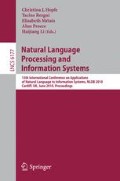Abstract
We present a lightweight, user-centred approach for document navigation and analysis that is based on an ontology of text mining results. This allows us to bring the result of existing text mining pipelines directly to end users. Our approach is domain-independent and relies on existing NLP analysis tasks such as automatic multi-document summarization, clustering, question-answering, and opinion mining. Users can interactively trigger semantic processing services for tasks such as analyzing product reviews, daily news, or other document sets.
Access this chapter
Tax calculation will be finalised at checkout
Purchases are for personal use only
Preview
Unable to display preview. Download preview PDF.
References
Mani, I.: Automatic Summarization. John Benjamins, Amsterdam (2001)
NIST: DUC 2001. In: Proceedings of the ACM SIGIR Workshop on Text Summarization DUC 2001, New Orleans, Louisiana USA, NIST (2001)
Dang, H.: Overview of the tac 2008 opinion question answering and summarization tasks. In: Proceedings of the First Text Analysis Conference (TAC 2008), Gaithersburg, Maryland, USA, November 17-19, NIST (2008)
Pang, B., Lee, L.: Opinion mining and sentiment analysis. Foundation and Trends in Information Retrieval 2(1-2), 1–135 (2008)
Cunningham, H., Maynard, D., Bontcheva, K., Tablan, V.: GATE: A Framework and Graphical Development Environment for Robust NLP Tools and Applications. In: Proc. of the 40th Anniversary Meeting of the ACL (2002), http://gate.ac.uk
Ferrucci, D., Lally, A.: UIMA: An Architectural Approach to Unstructured Information Processing in the Corporate Research Environment. Natural Language Engineering 10(3-4), 327–348 (2004)
Witte, R., Gitzinger, T.: Semantic Assistants – User-Centric Natural Language Processing Services for Desktop Clients. In: Domingue, J., Anutariya, C. (eds.) ASWC 2008. LNCS, vol. 5367, pp. 360–374. Springer, Heidelberg (2008)
Witte, R., Bergler, S.: Next-Generation Summarization: Contrastive, Focused, and Update Summaries. In: International Conference on Recent Advances in Natural Language Processing (RANLP 2007), Borovets, Bulgaria, September 27–29 (2007)
Witte, R., Khamis, N., Rilling, J.: Flexible Ontology Population from Text: The OwlExporter. In: Int. Conf. on Language Resources and Evaluation, LREC (2010)
Witte, R., Gitzinger, T., Kappler, T., Krestel, R.: A Semantic Wiki Approach to Cultural Heritage Data Management. In: Language Technology for Cultural Heritage Data (LaTeCH 2008), Marrakech, Morocco June 1, (2008)
Farrar, S., Lewis, W.D., Langendoen, D.T.: A common ontology for linguistic concepts. In: Proceedings of the Knowledge Technologies Conference (2002)
Hyvönen, E., Saarela, S., Viljanen, K.: Application of ontology techniques to view-based semantic search and browsing. In: Bussler, C.J., Davies, J., Fensel, D., Studer, R. (eds.) ESWS 2004. LNCS, vol. 3053, pp. 92–106. Springer, Heidelberg (2004)
Amardeilh, F., Laublet, P., Minel, J.L.: Document annotation and ontology population from linguistic extractions. In: K-CAP 2005: Proceedings of the 3rd international conference on Knowledge capture, pp. 161–168. ACM, New York (2005)
Java, A., Nirenburg, S., McShane, M., Finin, T., English, J., Joshi, A.: Using a Natural Language Understanding System to Generate Semantic Web Content. International Journal on Semantic Web and Information Systems 3(4) (2007)
Buitelaar, P., Cimiano, P., Haase, P., Sintek, M.: Towards linguistically grounded ontologies. In: Aroyo, L., Traverso, P., Ciravegna, F., Cimiano, P., Heath, T., Hyvönen, E., Mizoguchi, R., Oren, E., Sabou, M., Simperl, E. (eds.) ESWC 2009. LNCS, vol. 5554, pp. 111–125. Springer, Heidelberg (2009)
Author information
Authors and Affiliations
Editor information
Editors and Affiliations
Rights and permissions
Copyright information
© 2010 Springer-Verlag Berlin Heidelberg
About this paper
Cite this paper
Witte, R., Krestel, R. (2010). Semantic Content Access Using Domain-Independent NLP Ontologies. In: Hopfe, C.J., Rezgui, Y., Métais, E., Preece, A., Li, H. (eds) Natural Language Processing and Information Systems. NLDB 2010. Lecture Notes in Computer Science, vol 6177. Springer, Berlin, Heidelberg. https://doi.org/10.1007/978-3-642-13881-2_4
Download citation
DOI: https://doi.org/10.1007/978-3-642-13881-2_4
Publisher Name: Springer, Berlin, Heidelberg
Print ISBN: 978-3-642-13880-5
Online ISBN: 978-3-642-13881-2
eBook Packages: Computer ScienceComputer Science (R0)

